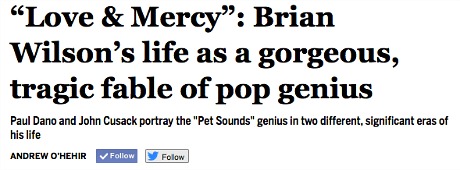Everyone seems fairly delighted with Paul Feig‘s Spy, which has a 95% Rotten Tomatoes rating. Then again it’s a spy movie spoof (a sub-genre that began roughly 50 years ago, inspired by the success of Goldfinger) in which Melissa McCarthy occasionally performs her default clumsy-fat-woman schtick…c’mon. Love & Mercy, by any measure a far more audacious and memorable achievement, has an 88% Rotten Tomatoes rating. Tens of thousands of popcorn-eaters will pay to see Spy this weekend while ignoring (or perhaps being totally ignorant of) Love & Mercy, but a percentage will make their moviegoing decisions this weekend based on the aggregate critics sites. It’s nothing close to tragic but the reason Love & Mercy is seven points below Spy right now is because it received six mixed reviews from Current.com’s Kurt Loder, L.A. Times critic Kenneth Turan, NPR’s Mark Jenkins, EW.com’s Chris Nashawaty, Slant‘s Christopher Gray and Grantland‘s Wesley Morris.

These critics are good fellows and their opinions are certainly permissible, but they all need to look in their bathroom mirrors this weekend and indulge in a little self-analysis. They could start with the following: “I know what Spy is and yet I gave it a total thumbs-up because it’s a lot of fun and well-made and even surprising as far as Jason Statham is concerned (who knew?), but also because I need to go easy on popular comedies that the popcorn crowd is going to support in massive numbers. By the same token I gave a hard time to Love & Mercy, and I did so because…well, because that’s my opinion, dammit. Yes, I realize it’s audacious and that most of my colleagues think it’s brilliant and one of the most profound biopics ever made but it didn’t quite do what I wanted it to do so I had to bitchslap it. I know no one will give a shit about Spy a month or two from now and that Love & Mercy is going to endure in people’s minds for decades. So who am I really? What am I?”
From Andrew O’Hehir’s Salon review: “When you consider all the ways that Love & Mercy could have gone terribly wrong, and how full of life it is in the end (and, yes, of love and mercy), I think the end product is almost miraculous. Pohlad, who has helped produce such prominent indie films as 12 Years a Slave, The Tree of Life and Into the Wild, was clearly paying attention along the way, because based on this project he is suddenly a director to be reckoned with. In telling the story of one damaged suburban genius and his unlikely rebirth, Love & Mercy captures the vanished possibilities of 1960s pop music, the fecklessness of the California dream and its decay into tragedy and madness, and other things less easy to describe or define.”
